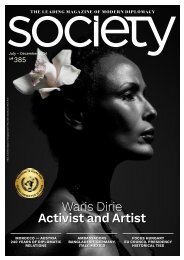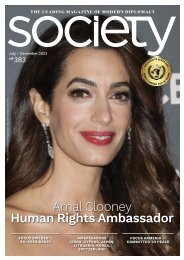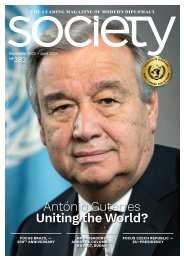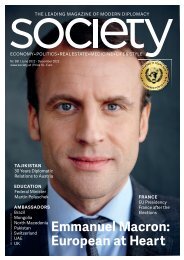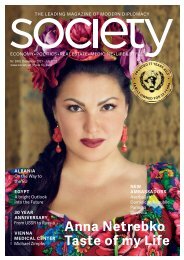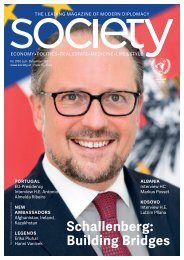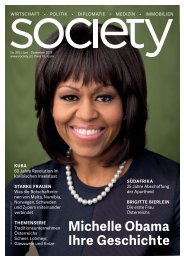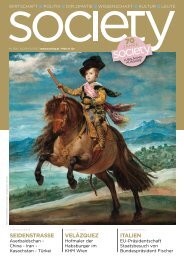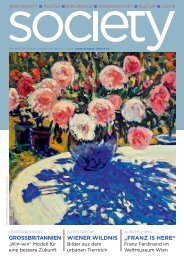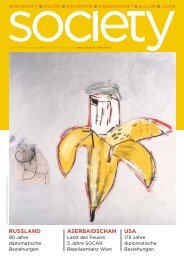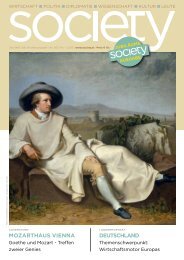SOCIETY 384
The latest issue of SOCIETY features Türkiye and Indonesia, as well as the late politician Henry Kissinger, an interview with Olga Stefanishyna and interviews with the Ambassadors of Kazakhstan, the Netherlands, Philippines, Slovakia and Thailand.
The latest issue of SOCIETY features Türkiye and Indonesia, as well as the late politician Henry Kissinger, an interview with Olga Stefanishyna and interviews with the Ambassadors of Kazakhstan, the Netherlands, Philippines, Slovakia and Thailand.
Create successful ePaper yourself
Turn your PDF publications into a flip-book with our unique Google optimized e-Paper software.
AMBASSADORS<br />
THE NETHERLANDS<br />
Coming full circle<br />
Since August 2023, H.E. Peter Potman has been Ambassador of the Netherlands to<br />
Austria and the International Organizations in Vienna. <strong>SOCIETY</strong> spoke with him about<br />
his career path and priorities as Ambassador. INTERVIEW BY TANJA TAUCHHAMMER<br />
46<br />
“Through this increasing<br />
disorder<br />
in the world,<br />
the cracks and<br />
fold lines are<br />
becoming more<br />
violent.”<br />
What are you looking forward to the most as an<br />
Ambassador? What will be the main focus in your<br />
work here?<br />
I would like to start by giving a little bit of background<br />
information about myself and the situation<br />
here for the Dutch Embassy in Austria. I have<br />
been working for the foreign service since 1988,<br />
which means that I started back in the days of the<br />
Cold War.<br />
My first posting was in Beijing, where I also met<br />
my wife, a Dutch Sinologist. Thereafter, I worked<br />
in the Asia department, and then went to Geneva<br />
to work in the field of disarmament. We negotiated<br />
the nuclear test ban treaty (CTBT). Today, the<br />
CTBTO is situated here in Vienna. Now I am the<br />
Permanent Representative to that organization,<br />
which I helped found by negotiating the Treaty in<br />
the middle of the 1990s.<br />
After that, I worked in The Hague, partially in the<br />
area of drugs and crime control, which is also covered<br />
by the UNODC in Vienna. As a junior officer,<br />
I was working on those subjects and now as an<br />
Ambassador, I am dealing with them once more.<br />
Subsequently, I worked in the field of nonproliferation<br />
and nuclear affairs, which is covered by<br />
the IAEA, also a Vienna based organization. Then<br />
we went to Washington, where I was<br />
working as Political Counsellor at the<br />
Embassy.<br />
From Washington DC, I went back to<br />
The Hague to work as the Head of the<br />
America department. In 2011, we went<br />
back to China where I served as Consul<br />
General in Shanghai. Coming back<br />
to The Hague, I became Director of the<br />
Asia and Oceania Department and then<br />
Deputy Vice Minister for Foreign Economic<br />
Relations. Now I am serving as<br />
Ambassador here in Vienna. I am telling you this,<br />
because the things that I am responsible for now,<br />
to a great extent, I already did a long time ago,<br />
some even before I became a diplomat.<br />
How has the world changed since you joined the<br />
foreign service in 1988?<br />
After the Cold War, during what I call the Pax<br />
Americana, the USA basically was a single superpower.<br />
China was still upcoming and Russia was<br />
cooperative during the 1990s. Back then, the world<br />
was a very positive one, for the Netherlands it<br />
was easy, we could rely on NATO for our security.<br />
We could build a stable economy inside the<br />
European Union and the United Nations was very<br />
much at the center of the world order. Everybody<br />
played the game. And what I have seen in the last<br />
ten years is, that this world order, the Pax Americana,<br />
is crumbling, mostly because of the rise of<br />
China, which is challenging the USA and Europe.<br />
Through this increasing disorder in the world,<br />
the cracks and fold lines are becoming more violent.<br />
I think these are the big changes that we<br />
have to go through, where we as Europeans have<br />
to get our act together. We have to become more<br />
geostrategic and ramp up our defense spending<br />
because this is the world we live in. As I have dealt<br />
also with the economy a great deal, it is also very<br />
important that as European Union, we establish<br />
more autonomy when it comes to our technology.<br />
Could you tell us about the historical ties between<br />
Austria and the Netherlands?<br />
Austria is a great place and our residence has been<br />
here, in the Strauss Schlössl, for such a long time.<br />
We have rented our residence from the Strauss<br />
family since 1949. The interesting thing is, that the<br />
plot where the house has been built on was part<br />
of the Botanical Garden which was founded in the<br />
eighteenth century by the Dutchman Gerard van<br />
Swieten, who was also the physician of Empress<br />
Maria Theresia. He was a very famous doctor, but<br />
also a scientist. To run that botanical garden, he<br />
contracted another Dutchman, Nikolaus Friedrich<br />
Freiherr von Jacquin.<br />
What are your priorities as Ambassador?<br />
My first priority is to have a good team that is<br />
happy and healthy, so that they can work efficiently,<br />
since thirty people is not a lot. My second<br />
priority as bilateral Ambassador is to have the best<br />
possible relations between Austria and the Netherlands.<br />
Another part of my work is to get to know<br />
a lot of people and build a strong network in order<br />
to further deepen these relationships.<br />
How would you describe the current relationship<br />
between our two countries?<br />
The relationships between the Netherlands and<br />
Austria are excellent in every respect and they are<br />
special because of the diversity of our connections.<br />
Austria is one of the favorite destinations<br />
for Dutch tourists. The Dutch come only after the<br />
Germans as the most frequent visitors to Austria.<br />
2,000,000 Dutch come here per year and they stay<br />
for 10,000,000 nights with Tyrol and Salzburgerland<br />
being their favorite destinations.<br />
Dutch people are also often part of Austria’s<br />
cultural scene, one example being the conductor<br />
Lotte de Beer, who was appointed as director<br />
of Volksoper Vienna, and starting in October<br />
next year, there will be a double exhibition in the<br />
THE LEADING MAGAZINE OF MODERN DIPLOMACY




